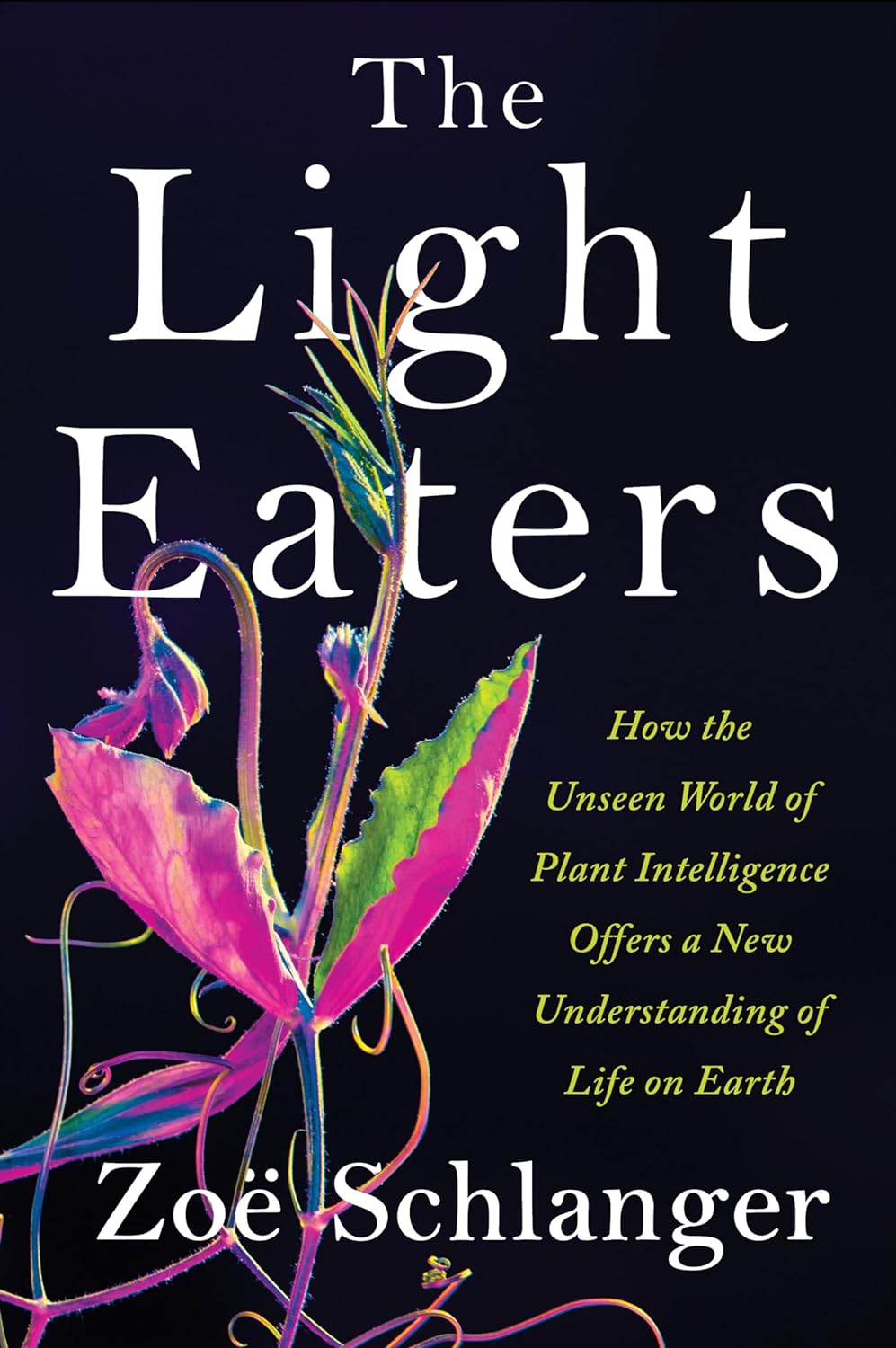The Light Eaters: How the Unseen World of Plant Intelligence Offers a New Understanding of Life on Earth by Zoe Schlanger
Summary (from the publisher): Award-winning environment and science reporter Zoë Schlanger delivers a groundbreaking work of popular science that probes the hidden world of the plant kingdom and reveals the astonishing capabilities of the green life all around us. It takes tremendous biological creativity to be a plant. To survive and thrive while rooted in a single spot, plants have adapted ingenious methods of survival. In recent years, scientists have learned about their ability to communicate, recognize their kin and behave socially, hear sounds, morph their bodies to blend into their surroundings, store useful memories that inform their life cycle, and trick animals into behaving to their benefit, to name just a few remarkable talents. The Light Eaters is a deep immersion into the drama of green life and the complexity of this wild and awe-inspiring world that challenges our very understanding of agency, consciousness, and intelligence. In looking closely, we see that plants, rather than imitate human intelligence, have perhaps formed a parallel system. What is intelligent life if not a vine that grows leaves to blend into the shrub on which it climbs, a flower that shapes its bloom to fit exactly the beak of its pollinator, a pea seedling that can hear water flowing and make its way toward it?
Zoë Schlanger takes us across the globe, digging into her own memories and into the soil with the scientists who have spent their waking days studying these amazing entities up close. What can we learn about life on Earth from the living things that thrive, adapt, consume, and accommodate simultaneously? More important, what do we owe these life forms once we come to understand their rich and varied abilities? Examining the latest epiphanies in botanical research, Schlanger spotlights the intellectual struggles among the researchers conceiving a wholly new view of their subject, offering a glimpse of a field in turmoil as plant scientists debate the tenets of ongoing discoveries and how they influence our understanding of what a plant is. We need plants to survive. But what do they need us for—if at all? An eye-opening and informative look at the ecosystem we live in, this book challenges us to rethink the role of plants—and our own place—in the natural world.
Review: I received an advance reader's edition of this book from HarperCollins in exchange for an honest review.
Environment and science reporter Zoe Schlanger presents an investigation into the current research and scientific thought on plant intelligence - their ability to communicate, their recognition of kin relationships, social interactions, and memories. Traversing the globe, the book presents multiple compelling examples of plants that have adapted and developed intelligent life required to survive and thrive.
This book provides so many compelling examples of plant intelligence: "When such plants find themselves beside their siblings, they rearrange their leaves within two days to avoid shading them. Pea shoot roots appeared to be able to hear water flowing through sealed pipes and grow toward them, and several plants, including lima beans and tobacco, can react to an attack of munching insects by summoning those insects' specific predators to come pick them off" (16). This book provided a whole new way of thinking about plant life from a static, unfeeling growth to an organism capable of advanced and rational decisions. It is wild to think about plants deliberately releasing chemical signals into the air that surrounding plants use to prepare defenses against predators. In effect, the plants under attack can warn nearby plants. And to learn that plants live more reciprocally and communicate more closely with other plants that they correctly identify as their kin. This is a world of social relationships and robust communication. Not in the way we think of in animals, but in their own quiet, stationary way.
Schlanger carefully articulates the reality that for decades the idea of plant "intelligence" has been unwelcome amongst the scientific community because it implied a consciousness akin to that found in animals and humans. But in this book she makes a strong argument that their intelligence is a parallel one but clearly intelligence, nonetheless. Plants aren't randomly growing; they are highly evolved over millennia to make deliberate choices and work in coordination with their surroundings to survive.
Despite offering up such interesting examples and really making me a think a lot, this felt like a slow read. Rather than staying on subject, the author shares random details and background on her travels and the backgrounds of the different scientists she talks to. I think this is meant to add interest and personality to the book, but I would have rather it stayed on the subject matter and just gotten on it with. Instead, it just made the narrative feel scattered. A really fascinating topic about ideas that seem to be building in momentum within the scientific community.
Stars: 3



Comments
Post a Comment